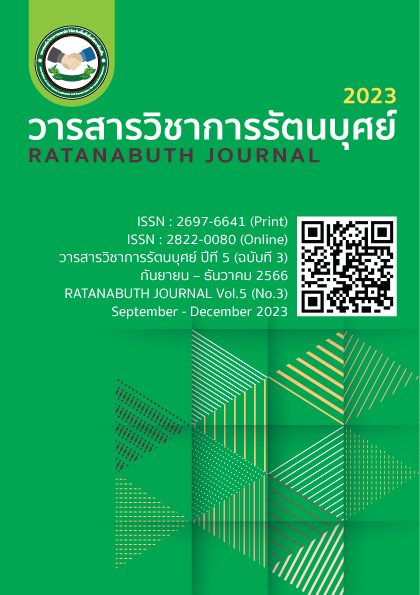Factors Affecting the Sustainable Management of Cross-border Ethnic Oroqen Cultural Heritage Conservation Factors Affecting the Sustainable Management of Cross-border Ethnic Oroqen Cultural Heritage Conservation
Main Article Content
Abstract
Problems of the Oroqen ethnic group living in different countries. We found that there are many cultural differences. Although in the past the border lines were not separated, The Oroqen ethnic group has a common culture and way of life. This problem arose due to the signing of the Nerchinsk Treaty. of the Oroqen people. This caused the Oroqen ethnic group to have a border, Keeping one group in China and one group in Russia. From the above problems, it was necessary to solve the problems for the Oroqen brothers and sisters. Maintain their ethnic culture even though they live in different countries. By researching and exploring factors that influence sustainable management. Empirical investigation and analysis. It was found that there are several important factors affecting the sustainable management of cross-border conservation of Oroqen ethnic cultural heritage. Including factors related to heritage, politics, markets, economics and culture. These factors interact with each other. It forms an important path to achieving sustainable management. As well as the methods necessary to achieve development. The findings from this study are critical to determining an effective formulation. Conservation strategies and management measures promote the sustainable development of the Oroqen cultural heritage.
Article Details

This work is licensed under a Creative Commons Attribution-NonCommercial-NoDerivatives 4.0 International License.
References
Anna Mariene Karlsson. (2021). Cultural heritage and the future. International Journal of Heritage Studies, 129-131.
Chistine Landorf. (2009). Managing for sustainable tourism: a review of six cultural World Heritage Sites, Journal of Sustainable Tourism, 17(1),53-70.
Huang Shan. (2021). Oroqen Ethnic Museum. picture. Interview 2021,07 27.
Huang Shan. (2022). Inheritor of Gurung Muta Festival in the Oroqen Ethnic Township of Shibazhan, Tahe County. Interview 2022, 06 27.
Han Youfeng. (1991) Oroqen Customs. Central Institute for Nationalities: Press.
Lindsay J. Whaley, Lenoro A. Grenoble, Fenzing Lee. (1999). Revisiting the Tunguses classification from the bottom up. Language publication, Linguistic Society of Amarica,75, (2) 286-321.
Liu Jun, (2017). OROQEN PEOPLE, THEIR HISTORY AND RELIGION. Museum of Nationalities, Central University for Nationalities. Retrieved 8 JUNE 2021 from https://factsanddetails.com/china/cat5/sub88/item160.htm.
Li Yi Fu. (1993).An Introduction to the Peoples of the World. Central Institute for Nationalities: Press.
Meng Shuzhen. (2023). Inheritor of Mosukun, a national intangible cultural heritage project, photo source: Heihe Intangible Cultural Heritage Protection Center. Interview 2023, 06 17.
Guan Jinfang. Northern Ethnic Minority Music and Dance Exhibition Successfully Held at China Conservatory of Music. China Conservatory of Music. Retrieved from: http://www.chnmusic.cn/jzhd/2019/0515/5131.html.
Ning Jizhen. (2021). National Bureau of Statistics of the People's. Republic of China, ed. China Statistical Yearbook 2021: China Statistics Press.
Shi Luguo. (1985).The Social Organisation of the Northern Tunguska, Inner Mongolia. People's, Publishing House.
Takashi Akiba. (1941). Ethnicities and Religions of Manchuria and Mongolia, Publishing Osaka Yahao.
Tomoshiro Chisong. (1941). Ethnicities and Religions of Manchuria and Mongolia,Publishing Osaka Yahao.
Wu Riwu. (2017). Threshold Existence – A Study on the Cross-Border Ethnic Identity Issue of the Oroqen Ethnic Group. Journal of Qinghai Nationalities University (Social Sciences Edition), 03,88-95.
Wang Yan, Fang Zheng. (2011). Literature Analysis of Oroqen Ethnic Origin. Heilongjiang Ethnic Series (02). Linguistic Society of Amarica.
Wa Yazhi. (2006). The Last Legend: A Study of Oroqen Culture. Central University for Nationalities Publishing House.
Yao Mianxin. (2021). Oroqen mutual visits during cross-border ethnic festivals between China and Russia. Interview 2021, 06 17.


